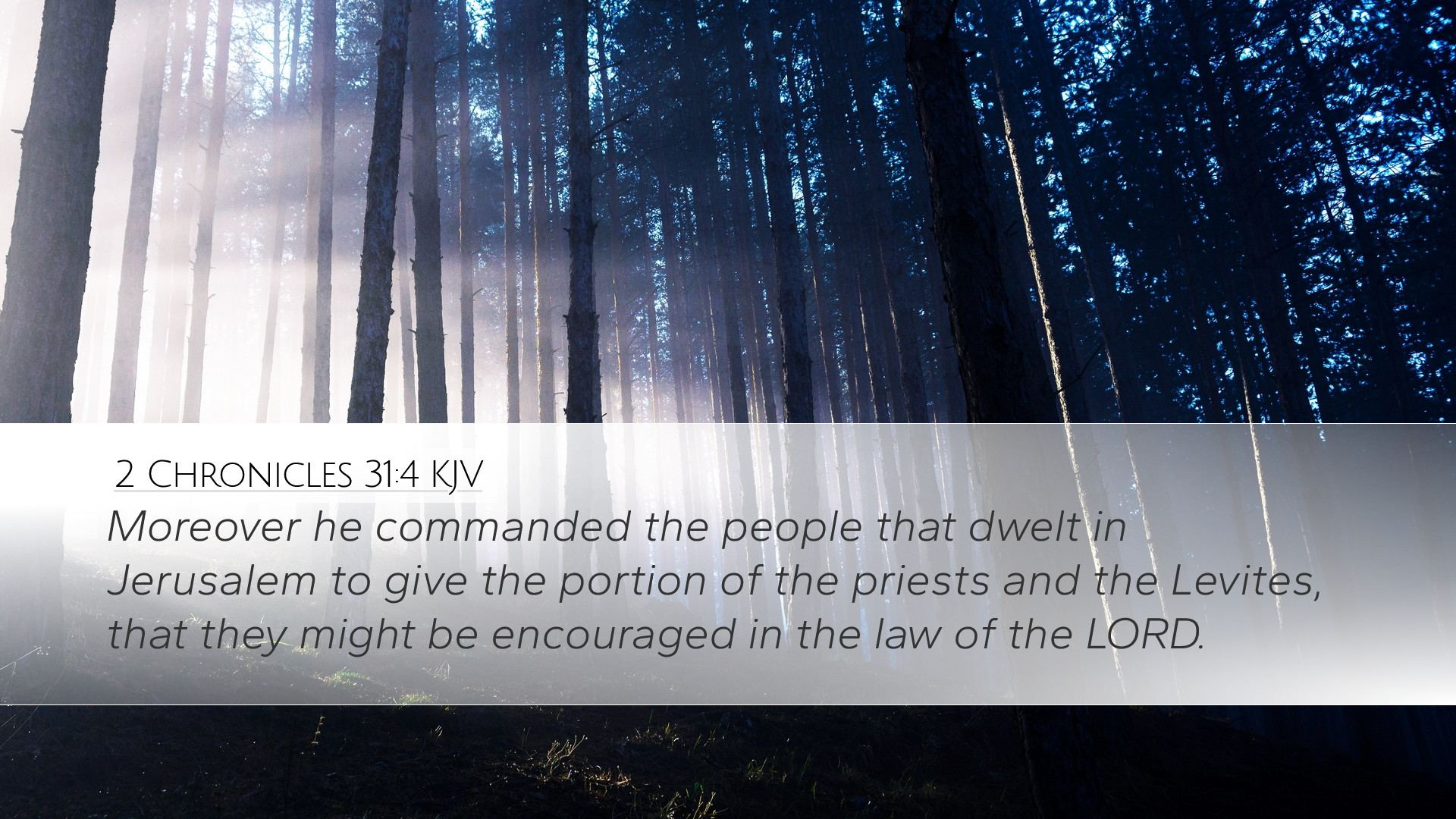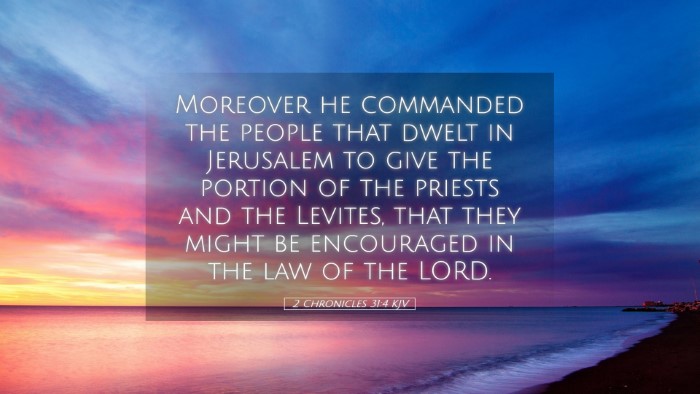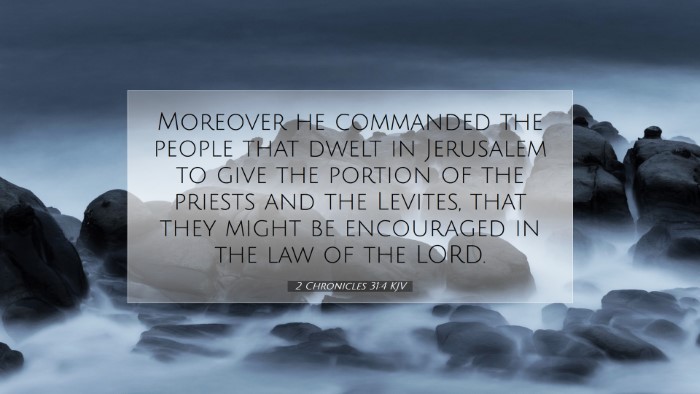Commentary on 2 Chronicles 31:4
Verse in Context: 2 Chronicles 31:4 reads, "Moreover, he commanded the people who dwelt in Jerusalem to contribute support for the priests and the Levites, that they might devote themselves to the Law of the Lord."
Introduction
This verse marks a significant moment in the reign of King Hezekiah, depicting his reforms in worship and the support system for the Levites and Priests. The underlying theme of 2 Chronicles 31:4 revolves around the implementation of the Law of the Lord and the necessary provisions for those serving in the sacred capacities. This commentary will delve into insights from well-regarded public domain scholars such as Matthew Henry, Albert Barnes, and Adam Clarke, combining their interpretations to provide a comprehensive understanding of this crucial passage.
Exegesis and Analysis
Hezekiah, as part of his reforms, recognizes the critical role that the Priests and Levites play in spiritual life. His command for the people to contribute to their sustenance represents a profound understanding of communal responsibility towards worship and spiritual leadership.
Matthew Henry’s Perspective
Matthew Henry emphasizes the importance of this act as a reflection of Hezekiah’s faithfulness to God’s covenant. He notes:
- Provision for Priests and Levites: Henry outlines that the support for the religious leaders is pivotal for the community's ability to access God's Law. This support enables them to focus on their duties without distraction.
- Community Involvement: He highlights the participation of the community, underscoring the collective responsibility that the people of God hold regarding spiritual leaders. This act binds the soul of the people to their worship.
- Application of Law: The enforcement of the Law through these provisions demonstrates a practical outworking of faith; it enriches the religious atmosphere within Jerusalem and cultivates an environment conducive to divine worship and adherence to the Law.
Albert Barnes’ Insights
Albert Barnes expands on the broader implications of Hezekiah’s decree, particularly how it illustrates God’s design for His people’s worship:
- Structure of Worship: Barnes asserts that God has orchestrated a system where worship is supported by the community. He reflects on the necessity of sustaining those who are set apart for the service of God.
- Contrast with Previous Reigns: He compares Hezekiah’s reforms to those of his predecessors, underscoring the restoration of true worship after periods of neglect and idolatry. This restoration necessitates unequivocal support for the Levites and Priests.
- Encouragement of Giving: Barnes reflects that Hezekiah’s call to contribute is not merely an obligation but a sacred privilege promoting generosity and a communal spirit towards divinely appointed leaders.
Adam Clarke’s Commentary
Adam Clarke brings attention to the legal and spiritual ramifications of Hezekiah’s command:
- Legal Foundation: Clarke highlights the biblical precedent of supporting the Levites as indicated in the Torah, stressing that this enactment is a fulfillment of God's command concerning the care for those in ministry.
- The Role of Spiritual Leaders: He elucidates that the pastors and priests have not only a ceremonial duty but also one that includes teaching and spiritual guidance, necessitating their full-time dedication.
- Spiritual Renewal: Clarke relates the contributions made by the people to a fresh commitment to God’s work in their midst, showing that the willingness to support worship leaders reflects a heart aligned with God’s purposes.
Theological Implications
The directive from King Hezekiah in this verse is indicative of several theological principles that transcend time:
- Community Responsibility: The principle of shared responsibility for spiritual leaders reinforces the biblical view of community and mutual support, a theme echoed throughout the New Testament where the church is called to support its ministers.
- Divine Service and Sustenance: The understanding that spiritual leaders must be actively supported reflects God's intent for order within worship and the acknowledgment of the needs of those who serve on behalf of the congregation.
- Renewal and Reform: Hezekiah's actions can serve as a contemporary call for renewal in worship practices within ministries, encouraging current leaders to assess how they are honored and supported in their roles.
Practical Applications for Modern Readers
As modern readers reflect on 2 Chronicles 31:4, several applications emerge:
- Support for Pastoral Leadership: Congregations today are challenged to consider how they faithfully support their spiritual leaders, recognizing the necessity of their full engagement in ministry.
- Pursuing Holistic Worship: Individuals and church bodies are called to engage actively in worship, acknowledging the importance of resources allocated to leaders’ spiritual development and ministry impact.
- Encouraging Generosity: This passage serves as a powerful reminder of the joy and privilege of giving, encouraging believers to contribute generously towards Kingdom work.
Conclusion
In summary, 2 Chronicles 31:4 not only underscores King Hezekiah’s commitment to renewing worship in Israel but also illustrates the critical necessity of community support for spiritual leaders. Drawing insights from the commentaries of Matthew Henry, Albert Barnes, and Adam Clarke, we find that the call to support those dedicated to God’s work is timeless, inviting ongoing reflection and application within the church today.


